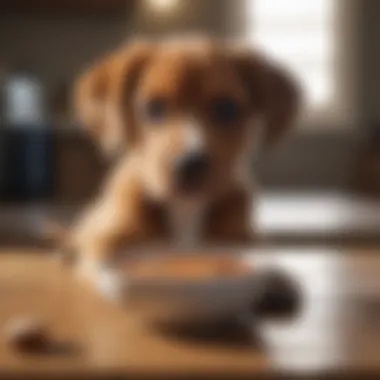Essential Nutrition Guidelines for Puppies with Diarrhea


Intro
Puppies can be susceptible to various health issues, and diarrhea is one of the more urgent concerns for young dogs. Understanding the nutritional needs during such an episode is fundamental to their recovery. This article will guide pet owners on how to navigate the complex landscape of feeding puppies who are experiencing diarrhea, ensuring they receive the right balance of nutrients while also addressing their specific health requirements. By focusing on appropriate food choices, monitoring their condition, and knowing when to engage veterinary assistance, pet owners can effectively support their puppies through this distressing time.
Understanding Your Pet
Breed Traits
Different breeds exhibit varying sensitivities to dietary changes. Some breeds, like the Labrador Retriever, might be more inclined to digestive issues, while others may stomach changes better. Understanding your puppy’s breed can offer insights into their unique dietary requirements and potential health concerns. Assessing these traits is essential as it can impact the type of recovery food you choose.
Common Temperaments
Puppies have distinct temperaments, influenced by their breed and upbringing. While temperament does not directly correlate with health issues like diarrhea, it can affect how your puppy reacts to dietary adjustments. For instance, calmer breeds may adapt easier, mientras that more energetic ones could display signs of discomfort more easily.
Special Needs
Some puppies may have underlying health conditions that require special nutritional considerations. For example, a puppy with a sensitive stomach may benefit from easily digestible diets that are low in fat. Always remain vigilant to their unique needs, as neglecting these can prolong recovery.
Nutrition and Feeding Guidelines
When addressing diarrhea in puppies, nutrition plays a vital role. The primary goals are to stabilize their digestive system and replenish lost nutrients. Here are key guidelines to consider:
- Gradual Introduction of Food: Start reintroducing food slowly after a fasting period. This allows the digestive system to settle.
- Bland Diet Options: Offer bland foods such as boiled white rice and unsweetened pumpkin. These foods are gentle on the stomach and can help firm up stools.
- Hydration: Ensure your puppy remains hydrated. Dehydration is a risk with diarrhea. Water or an electrolyte solution can help.
- Probiotics: Consider adding probiotics to their diet. These can support gut health and aid recovery.
Monitoring your puppy's behavior and stool consistency is crucial to assess the effectiveness of the dietary changes.
Health and Wellness
Momentarily, while focusing on diet, health checks are also necessary. Regular monitoring of your puppy’s overall condition can indicate whether dietary adjustments are working or if veterinary attention is necessary. If diarrhea persists for more than a day or two, or if you observe any signs of lethargy, it's important to consult a veterinarian.
Understanding the nuances of nutrition during diarrhea is essential yet can be daunting. By being observant and responsive to your puppy's needs, you can foster a quicker recovery and establish a healthy diet framework for the future.
Understanding Diarrhea in Puppies
Understanding diarrhea in puppies is crucial for pet owners. It allows them to identify when their pet is unwell and to take appropriate action. Diarrhea can be a sign of many underlying issues, ranging from minor dietary indiscretion to severe infections. Recognizing the various aspects of this condition is beneficial for ensuring the puppy's health and well-being.
Common Causes of Diarrhea
There are several reasons why a puppy may experience diarrhea. Some of these include:
- Dietary Changes: Sudden changes in diet can upset a puppy's digestive system. New foods should be introduced gradually.
- Infections: Bacterial, viral, or parasitic infections can lead to diarrhea. For instance, giardiasis or parvovirus needs immediate attention.
- Food Sensitivities: Some puppies may develop intolerances or allergies to certain ingredients in their food, resulting in gastrointestinal upset.
- Overeating or Eating Spoiled Food: Puppies often eat too fast or consume items they shouldn’t, which can cause digestive issues.
- Stress: Changes in the environment, such as moving to a new home or changes in routine, can impact a puppy’s digestive health.
Symptoms to Observe
It's important to monitor the puppy closely when it has diarrhea. Here are symptoms to keep an eye on:
- Increased frequency of bowel movements
- Presence of blood or mucus in the stool
- Vomiting, which may accompany diarrhea
- Signs of lethargy or decreased energy
- Anorexia or diminished appetite
- Abdominal pain or discomfort
Identifying these symptoms early can help in managing the puppy's condition effectively.


When to Be Concerned
While diarrhea can often resolve on its own, there are times when it requires immediate veterinary attention. Pet owners should be concerned if:
- The diarrhea lasts longer than two days
- There is significant dehydration, evidenced by dry gums or excessive thirst
- Blood appears in the stool
- The puppy is less active or shows signs of discomfort
- Vomiting persists or occurs with diarrhea
- Weight loss is noticeable
It is critical not to delay seeking professional help in these situations, as underlying issues may worsen if left untreated.
Immediate Dietary Adjustments
Immediate dietary adjustments are crucial when addressing diarrhea in puppies. A sudden change in diet may exacerbate the issue, leading to further complications. Therefore, implementing careful modifications can significantly improve a puppy's recovery process. The focus needs to be on rest, proper nutrition, and hydration. This section explores two primary adjustments: fasting and transitioning back to regular food.
Fasting Your Puppy
Fasting can be an effective initial response when dealing with diarrhea in puppies. It gives the digestive system a much-needed break. During a fast, the gut can heal itself and reduce irritation. Generally, fasting for 12 to 24 hours is recommended for young dogs, but always consider the puppy's age and health.
- Not all puppies should be fasted.
- Puppies younger than 12 weeks may require special attention, as they can become dehydrated quickly.
- Monitor their behavior. If they seem lethargic or disinterested in drinking water, consult a veterinarian.
This temporary abstention from food can help flush out irritants or toxins disrupting the digestive system. However, ensure that your puppy has access to fresh water throughout the fasting period.
Transitioning Back to Regular Diet
Once the fasting period is over, the gradual transition back to regular food should start. This step is vital for avoiding any shock to the digestive system. The idea is to reintroduce food slowly, using small portions of bland diets. Consider the following:
- Begin with bland options: Reintroducing easily digestible food like boiled chicken and rice can help.
- Small, frequent meals: Offer small meals throughout the day rather than one large serving. This approach can decrease the load on the digestive system.
- Monitor for any return of symptoms: Pay attention to how your puppy reacts after eating. If diarrhea resumes, it may be necessary to revert to fasting or consult a veterinarian.
Overall, transitioning back should occur over three to four days, allowing for a gradual reintroduction of regular food.
Proper management of diet during this recovery period can make a significant difference in overall health and well-being of your puppy.
Recommended Foods for Recovery
In the context of puppies experiencing diarrhea, the choice of food plays a crucial role in their recovery. Offering the right foods can help soothe their digestive system, restore nutrient balance, and combat dehydration. The recovery phase often requires specific dietary considerations that differ from regular feeding practices. Optimal food selections can mitigate gastrointestinal distress and support overall health during this vulnerable time.
Bland Diet Options
Boiled Chicken and Rice
Boiled chicken and rice is a well-known bland diet option for puppies suffering from diarrhea. This combination is easy to digest and provides the necessary protein and carbohydrates for energy. The primary feature of this dish is its simplicity, devoid of spices and other irritants. This characteristic makes it appealing for puppies whose stomachs are sensitive.
Additionally, boiled chicken is lean, providing essential amino acids without excess fat. While rice acts as a gentle binding agent, helping firm up loose stools. However, it's vital to ensure the rice is well-cooked to prevent any potential digestive issues. Some owners may find this option to be effective in stabilizing their puppy's condition without exacerbating any symptoms.
Pumpkin Puree
Pumpkin puree is another popular option for recovering puppies. Its high fiber content can aid in regulating bowel movements, which is essential when addressing diarrhea. The key aspect of pumpkin puree is its natural source of soluble fiber. This helps absorb excess water in the intestines.
Being a nutrient-dense food, it also offers vitamins A and C, which can support recovery in puppies. However, it's important to note that only plain, canned pumpkin puree should be used. Added sugars or spices can be harsh on their sensitive stomachs. It's advisable to monitor the amount fed, as too much fiber might lead to further digestive upset in some cases.
Plain Yogurt


Plain yogurt can be beneficial for puppies recovering from diarrhea due to its probiotics. Probiotics are beneficial bacteria that can help restore the gut flora disrupted during gastrointestinal distress. The key feature of plain yogurt lies in its simplicity and natural formulation. It's important to choose yogurt without added sugars or artificial flavors.
The unique attribute of plain yogurt is its creamy texture, which can be appealing to many dogs. However, some puppies may be lactose intolerant, leading to further digestive issues. Therefore, it’s essential to introduce this food gradually and observe any adverse reactions. For those puppies that can tolerate it, yogurt can provide a soothing effect on the stomach and contribute to a healthier digestive system.
Commercial Diets for Diarrhea
Veterinary Prescription Diets
Veterinary prescription diets are tailored specifically for puppies with digestive issues, including diarrhea. These diets contain controlled ingredients that are scientifically formulated for optimal recovery. The primary characteristic of these diets is their balance of nutrients designed to be easy on a puppy's digestive system.
One notable advantage of veterinary prescription diets is liquid content, addressing hydration while providing essential nutrients. These diets often come in various formulations based on underlying conditions, making them a recommended choice for many pet owners. However, acquiring these diets typically involves a veterinarian’s consultation, ensuring they’re suitable for your puppy's specific needs.
Hydration Solutions
Hydration is critical during diarrhea recovery. Hydration solutions, such as electrolyte solutions, can help replenish lost fluids and minerals. The significant aspect of these solutions is their formulation, designed to quickly rehydrate and stabilize a puppy’s condition. They usually contain electrolytes like sodium and potassium, essential for maintaining proper bodily functions.
The unique benefit of hydration solutions is their ability to prevent severe dehydration, which can be life-threatening in young puppies. However, these solutions should complement, not replace, fresh water. It is also prudent to check with a veterinarian regarding the appropriate amount and type of hydration solution to use, ensuring it meets the needs of the puppy recovering from diarrhea.
Hydration Importance
Maintaining hydration is crucial for puppies, especially when they experience diarrhea. Diarrhea can lead to rapid fluid loss, putting young dogs at serious risk of dehydration. Puppies already have a higher water requirement due to their size and metabolism, making these situations even more critical. Therefore, understanding the signs of dehydration and knowing how to ensure proper hydration remains essential for their recovery.
Signs of Dehydration
Recognizing the signs of dehydration in puppies is an important first step for pet owners. Look for the following indicators:
- Dry or Sticky Gums: Healthy gums should be moist. If they feel dry or sticky, it may signal dehydration.
- Skin Elasticity: Gently pinch the skin on the back of the neck. If it does not spring back quickly, this could be a sign of dehydration.
- Lethargy: If your puppy is less active than usual or shows signs of weakness, it may indicate insufficient hydration.
- Sunken Eyes: Puppies with dehydration may have eyes that appear sunken, which is concerning.
- Decreased Urination: Less frequent urination or dark-colored urine can indicate fluid deficiency.
If you observe any of these signs, it is essential to take action immediately to rehydrate your puppy.
How to Maintain Hydration
To ensure your puppy stays hydrated during episodes of diarrhea, consider the following methods:
- Provide Fresh Water: Always have clean and fresh water accessible. Encourage your puppy to drink frequently.
- Electrolyte Solutions: Use pet-specific electrolyte solutions to replenish lost fluids. Products such as Pedialyte can be suitable, but consult your vet before using it.
- Water-Added Food: Consider blending water with bland diet options like boiled chicken and rice. This can help increase fluid intake.
- Puppy-Safe Broths: Low-sodium chicken or beef broth can encourage drinking. Ensure it does not contain harmful ingredients like onions or garlic.
- Frequent Small Amounts: Offer small amounts of water more often. Puppies might be hesitant to drink large quantities, especially if they are feeling unwell.
Important: In severe cases of dehydration, consult a veterinarian quickly. They may recommend intravenous fluids to restore balance.
By being vigilant about hydration, you can greatly support your puppy’s recovery and overall well-being during a challenging time.
Vets and Diarrhea Management
Vets play a critical role in the management of diarrhea in puppies. Understanding the necessity of professional help can make a significant difference in the health trajectory of your pet. Diarrhea, while sometimes manageable at home, can signify underlying health issues. Hence, consulting a veterinarian is crucial in cases where symptoms persist or intensify. A vet can offer specialized assessments to determine the cause of diarrhea and recommend appropriate treatments.
The benefits of involving a veterinarian are multifaceted. Firstly, they can conduct diagnostic tests to rule out serious infections or disease processes. Their expertise allows for tailored interventions that address the puppy's unique health needs. Furthermore, vets can provide peace of mind to pet owners who may feel overwhelmed by their puppy's condition. Keeping an open line of communication with a vet enhances the management of health issues and promotes a quicker recovery.
It’s important to note that waiting too long to seek veterinary assistance can lead to worsening conditions, making early intervention vital.
When to Consult a Veterinarian


Several signs should prompt immediate consultation with a veterinarian. If diarrhea persists for more than a day or is accompanied by blood, it is crucial to seek professional advice. Other concerning symptoms include dehydration, characterized by lethargy or decreased appetite. Puppies show less tolerance to fluid loss due to their small size, making rapid medical attention essential. Additionally, if your puppy has been exposed to toxins or has a history of underlying health issues, reach out to your vet as soon as possible.
Along with these indicators, it is wise to consult a veterinarian if there is a drastic change in behavior, such as unusually aggressive or withdrawn actions. Puppies that exhibit significant discomfort, panting, or whining may require urgent care. Paying attention to these signs can help mitigate serious health problems.
Follow-Up Care
Once consultative measures have taken place and treatments have been initiated, follow-up care becomes integral to the recovery process. Regular check-ups allow the vet to monitor your puppy's progress. During these visits, updates regarding dietary adherence and general wellbeing will be reviewed.
Pet owners should maintain proper documentation of their puppy’s symptoms and any dietary changes implemented. This information assists veterinarians in making informed decisions regarding ongoing treatment plans. It's also helpful to keep track of any reactions your puppy exhibits to prescribed medications or dietary modifications. Adjustments may be necessary based on these observations.
Long-term care should focus on building a robust immune system following a bout of diarrhea. This can be achieved by ensuring a balanced diet rich in nutrients suited for your puppy's age and breed. Collaborating with your veterinarian to develop an appropriate dietary plan will benefit your puppy's overall health.
Nutritional Considerations Post-Diarrhea
Puppies recovering from diarrhea need careful attention regarding their diet. It is crucial to understand that even after the immediate symptoms subside, their digestion and overall health are still sensitive. Proper nutritional considerations play a pivotal role in helping them regain strength and restore their gut health. It is not just about what they eat, but also how their food is introduced and the long-term diet planning that follows.
Reintroducing Regular Food
After a period of fasting or consuming bland diets, it is important to reintroduce regular food gradually. This step should not be rushed. A sudden return to their normal diet can upset their digestion once again. Start with small portions of their regular dog food mixed with the bland diet. Observe how the puppy reacts during this period. If they show no signs of further diarrhea, you can slowly increase the amount of regular food while decreasing the bland diet components.
Key points to consider during this transition include:
- Duration: Allow at least three to five days for this process.
- Consistency: Ensure the regular food is of high quality and fits the puppy's age and size requirements.
- Monitoring: Keep an eye on stool consistency and overall behavior. If problems arise, revert to previously recommended bland options and consult your veterinarian.
Long-Term Diet Planning
Once a puppy has fully recovered, long-term diet planning becomes essential. A balanced diet is vital for maintaining their health and preventing future digestive issues. High-quality commercial puppy food that meets nutritional standards is often recommended. Brands like Royal Canin and Hill’s Science Diet provide special formulations that cater to the needs of growing puppies.
Consider the following aspects when planning a long-term diet:
- Nutritional Balance: Look for foods rich in protein, essential fatty acids, and vitamins. Avoid fillers and artificial additives.
- Hydration: Regular access to water is critical to avoid dehydration in the future. Hydration should be a part of the food strategy too.
- Regular Vet Check-ups: Schedule annual examinations with your veterinarian to adapt the diet as your puppy grows into adulthood.
Remember: Consistency and quality in nutrition will help ensure long-term health and well-being for your puppy. Plan ahead to avoid future dietary challenges.
Epilogue
First, monitoring hydration becomes paramount. Dehydration may pose serious risks to a puppy's health, especially in cases of diarrhea. Providing access to fresh water and considering hydration solutions can be effective strategies in maintaining their hydration levels.
Second, the introduction and reintroduction of appropriate foods can significantly affect recovery. The diet must be bland initially, followed by a gradual transition back to regular food. This step helps ensure that the digestive system can cope without being overwhelmed.
Additionally, while some pet owners may feel apprehensive about dietary adjustments, consulting with a veterinarian offers assurance that the chosen method is appropriate for the specific puppy's situation. Professional guidance can optimize recovery in challenging situations like diarrhea. Knowing when to seek help can prevent further complications.
Finally, the importance of long-term diet planning cannot be overstated. Ensuring a balanced diet that caters to the puppy’s growth and digestive well-being is vital. Post-recovery, a well-structured nutrition plan can play a significant role in preventing future gastrointestinal issues.
By respecting these guidelines, pet owners can navigate the distressing experience of puppy diarrhea with greater confidence and effectiveness. The emphasis should always remain on a tailored approach that considers individual puppy needs, with vigilance and care as enduring themes throughout the recovery process.
Summary of Key Points
- Hydration management is vital during diarrhea. Watch for signs of dehydration.
- Start with a bland diet; consider options like boiled chicken and rice.
- Gradually reintroduce regular food to avoid digestive upset.
- Seek veterinary advice when needed to ensure the best course of action.
- Long-term dietary planning is essential for a puppy's overall health and future prevention of issues.
Encouragement for Pet Owners
Managing a puppy with diarrhea can be overwhelming and stressful. It is natural to feel concerned about a young dog's health. However, with the right information and actions, recovery is entirely achievable. Remember, you are not alone in this journey. Countless pet owners face similar situations and find success.
Regular veterinary check-ups, combined with attentive observation at home, will offer a strong foundation for your puppy’s health. Trust your instincts. Stay informed about the nutritional needs and adjustments necessary for recovery.
Ultimately, providing a nurturing environment plays a critical role in helping your puppy feel secure during their recovery. Stay patient and proactive, and you will see your puppy return to health with the joy and playfulness that you cherish.



